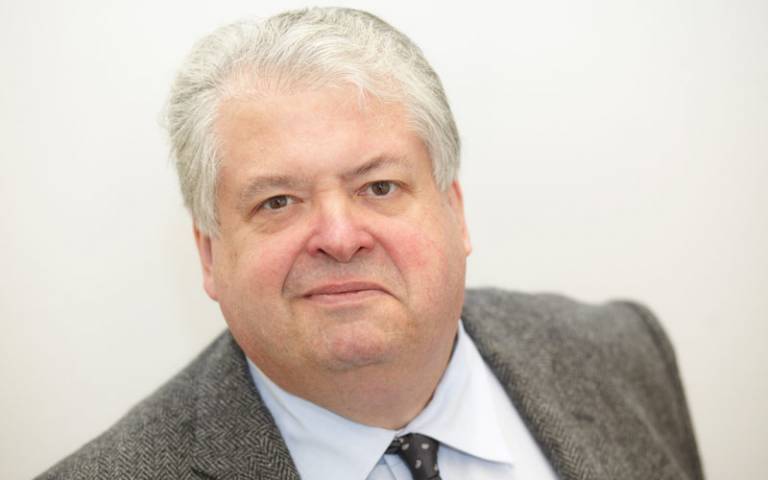Vice-Provost's View: Maximising our impact on the UN’s Sustainable Development Goals
16 September 2020
Professor David Price, Vice-Provost (Research), talks about the role of UCL and other universities in achieving the UN's Sustainable Development Goals (SDGs) and highlights some of the ways in which you can get involved – including the Beyond Boundaries conference on 19 October.

Last year, we launched our plan to connect UCL’s pioneering cross-disciplinary Grand Challenges with the UN’s Sustainable Development Goals (SDGs). An early manifestation of this is the two-week virtual conference, Beyond Boundaries: Realising the UN Sustainable Development Goals. This event, which we’re co-delivering with the Global Engagement Office (GEO), seeks to explore the role of universities in achieving the SDGs – registration is open.
We’re cognisant that achieving the SDG targets will require a joined-up, as well as interdisciplinary approach, and are keen to work collaboratively across UCL with other offices and faculties that are incorporating the SDGs into their strategic thinking. Groups like the Sustainability Team which launched an ambitious strategy earlier this academic year, and the GEO which is developing plans to engage global partners and thought leaders around the SDGs.
We want to improve our understanding of the many ways in which UCL staff and students are already helping to meet the targets set out in the Sustainable Development Goals – please share your activities through this short survey.
Why the SDGs matter to UCL
The SDGs are 17 Goals agreed by UN Member States in 2015 to provide a framework for promoting economic growth while protecting the environment and addressing social inequalities. Importantly, though global by design, they have relevance to communities worldwide, and apply as much in the UK, in London and across our campuses, as they do overseas.
Our intention is to support UCL’s community in developing fruitful cross-disciplinary collaborations, and facilitate holistic responses to real-world problems, and to use the 17 Goals identified by the UN to inform and inspire new research partnerships. The Goals speak to UCL’s core mission: to support and inspire research and learning with real-world impact, and demonstrate how we are addressing global problems.
UCL has always been a place where people want to use their expertise for the benefit of humanity, and we understand that the biggest issues facing the world today are complex and intersectional. Nowhere has this been more acutely observed than during the COVID-19 pandemic, which has required not just clinical and public health expertise, but also engineering, an understanding of human behaviour, economics, social inequality, business continuity planning, education and so much more. Despite, or because of its awful threat to life, the pandemic has generated many pathways for our world-class research to support and inform national and international need.
What we are doing next
Over the coming year and beyond, through a pan-institutional initiative, we aim to:
- continue undertaking research and encourage collaborative solutions to solve the global problems identified by the SDGs
- play a leading role in many of the global networks and bodies that are furthering the academic response to the SDGs, where it is feasible, beneficial and appropriate to do so
- lead the conversation around the practice, application and methodology of the SDGs, which themselves present challenges that require close examination, as colleagues at UCL already are
- consider how our own operations and policies could better contribute to the SDGs
- equip our students – the next generation of researchers, policymakers and innovators – to help to solve the SDGs in decades to come.
In doing so, we will make UCL a more attractive place to study and work, our graduates more attractive to employers, and the university a more attractive prospect for local, UK and global partnerships, for example with higher education institutions, communities, philanthropists, policymakers and industry.
We know that there is a wide range of activity already taking place at UCL that is supporting the Goals, across our teaching, research, student activities, operations and public engagement.
Already we’ve seen a diverse and creative range of responses to the SDGs; notably, the work of Sustainable UCL on embedding the SDGs in UCL’s sustainability strategy, to ensure a meaningful commitment to making UCL more sustainable. Furthermore, colleagues in UCL Engineering have developed and piloted an online course, the Ocean Health Challenge, to get prospective students thinking about how research can address plastic pollution.
We’re mapping what is already happening, so that we can benchmark our strengths and weaknesses. The results will also provide a framework to amplify those strengths and address any weaknesses, through cross-disciplinary collaboration within and beyond UCL.
How you can get involved
We know many of you are making the world a better place. We want you to tell us how: Use our short survey to tell us how your research, teaching and other activities are helping to meet the targets set out in the Sustainable Development Goals.
Register for Beyond Boundaries: UCL Grand Challenges and the Global Engagement Office are hosting a two-week virtual conference, Beyond Boundaries, which seeks to explore the role of universities in achieving the SDGs, as well as facilitating new connections and sharing best practice.
Professor David Price, UCL Vice-Provost (Research)
 Close
Close

